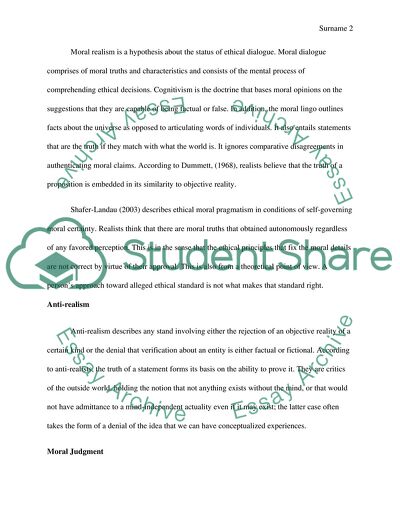
- Home
- Free Samples
- Premium Essays
- Editing Services
- Extra Tools
- Essay Writing Help
- About Us
- Studentshare
- Subjects
- Miscellaneous
- I dont know what the topic, find the topic
I dont know what the topic, find the topic - Essay Example

- Subject: Miscellaneous
- Type: Essay
- Level: Masters
- Pages: 4 (1000 words)
- Downloads: 0
- Author: uwisozk
Extract of sample "I dont know what the topic, find the topic"
The many beliefs in the universe present a difficulty in reaching an agreement on this issue. For instance, religious followers tend to instruct different sets of basic convictions that they defend strongly against other pious beliefs. It is, therefore, difficult to tell whether a certain belief is incorrect because there are different gauges applied to this regard: an individual’s system of morality compared to that of a group, divinity instructions of different religions or conclusions of truth-seekers over the years.
Moral realism is a hypothesis about the status of ethical dialogue. Moral dialogue comprises of moral truths and characteristics and consists of the mental process of comprehending ethical decisions. Cognitivism is the doctrine that bases moral opinions on the suggestions that they are capable of being factual or false. In addition, the moral lingo outlines facts about the universe as opposed to articulating words of individuals. It also entails statements that are the truth if they match with what the world is.
It ignores comparative disagreements in authenticating moral claims. According to Dummett, (1968), realists believe that the truth of a proposition is embedded in its similarity to objective reality. Shafer-Landau (2003) describes ethical moral pragmatism in conditions of self-governing moral certainty. Realists think that there are moral truths that obtained autonomously regardless of any favored perception. This is in the sense that the ethical principles that fix the moral details are not correct by virtue of their approval.
This is also from a theoretical point of view. A person’s approach toward alleged ethical standard is not what makes that standard right. Anti-realism describes any stand involving either the rejection of an objective reality of a certain kind or the denial that verification about an entity is either factual or fictional. According to anti-realists, the truth
...Download file to see next pages Read MoreCHECK THESE SAMPLES OF I dont know what the topic, find the topic
Taboo Topic of Conversation in the United States
Educational Goals and Rationale
How to Write a Thesis
Modern Biological Techniques
The Human Element and an Excellent Presentation
A Design of an Education Program Based on the Health People 2020 Objective
Term Papers Contents
Hazardous Materials Chemistry for Emergency Responders

- TERMS & CONDITIONS
- PRIVACY POLICY
- COOKIES POLICY